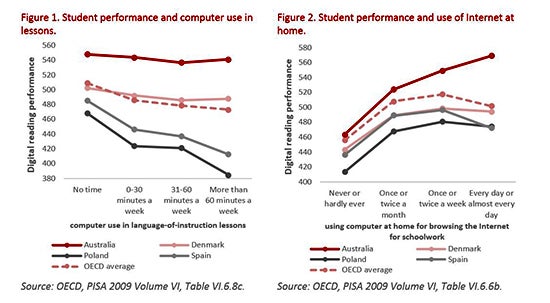 Adults lacking sufficient computer skills have a lower chance of finding employment. The recent PIAAC survey of adult skills by the OECD finds that adults without computer experience or those who fail on basic ICT tasks when solving problems in a technology rich environment are more often unemployed or out of the labour market.
Adults lacking sufficient computer skills have a lower chance of finding employment. The recent PIAAC survey of adult skills by the OECD finds that adults without computer experience or those who fail on basic ICT tasks when solving problems in a technology rich environment are more often unemployed or out of the labour market.
On average, across participating OECD countries, only 52.5% of adults reporting lack of computer skills were employed, compared to 72.7% among those who mastered at least a basic level of proficiency to solve problems on computers. Indeed, employment rates increase with skill levels. Among those at the highest proficiency levels who can solve more complex tasks using computers, the employment rate increases to 78.2%.
Because of these facts, schools should equip students with computer skills that will allow them to fully participate in our rapidly changing economies. The question remains how to do that effectively and on which computer skills schools should focus. Computers have changed our lives in many ways. They should also change schools and education in general. But, these expectations are not always being met and are not always clearly defined.
A decade or two ago it was widely believed that computers and internet-based tools would improve education systems all over the world. Despite the lack of evidence on what works in practice, governments invested significant funds into providing schools or students with computers and internet connections. Today most schools in developed countries have at least basic ICT infrastructure.
However, introducing computers into schools generates both new opportunities and challenges and it is difficult to find conclusive evidence on the positive effects of computer use on student outcomes. The question remains as to whether students and schools do need more ICT infrastructure and how it really relates to teaching and learning.
Basic computer skills are often acquired by students without any school involvement. The evidence from the PISA survey shows that usage of computers at home is usually positively associated with the level of student computer skills. However, there is no evidence that students benefit from computers at school. This lack of correlation between the usage of computers at school and student performance is striking. In some countries there is even a negative correlation: the more classroom computer use, the lower the performance of students.
In none of the OECD countries is the use of computers in schools associated with evidently better student performance. Using computers and other ICT devices without clearly defined purpose can, in fact, distract students and undermine learning results. Another misconception is the belief that computers will limit the need for knowledge as all information is readily available on the internet. However, a vocabulary of basic facts is a prerequisite to apply skills efficiently. Thus, lack of knowledge is still a major obstacle for most of the students.
The graph in high resolution.
As virtually all schools in developed countries have computer labs and access to the Internet, governments should no longer focus on providing equipment. The results above suggest that students acquire basic computer knowledge at home, but schools are not able to build upon that. The role of schools should be rather to teach students how to use computers and Internet in more sophisticated ways that facilitate learning and individual development.
Mastering basic ICT skills is necessary but not sufficient to participate in the economy and for many of the jobs available. Hence the challenge of rising importance is to teach students more advanced computer skills or how to use computers more creatively. For example, students can learn how computers work through coding classes or by constructing simple machines. This has been recognized in the United Kingdom, where the coding lessons have been introduced recently to student curricula starting from as early as the five-year old pupils.
There are also more nuanced aspects of computer usefulness for teaching. For example, the reading gender gap exists in all countries – PIRLS and PISA results show that boys are outperformed by girls in reading at the age of 10 and at the age of 15. However, in most countries, this gap becomes much smaller if tests are conducted on computers and when reading of internet-like information is assessed. Creating environments where boys are motivated to read and use computers in a way that provokes them to read longer texts might be a way to improve their skills.
At the same time, girls sometimes show similar anxiety with computers as they do with mathematics or science. A policy challenge in this case is to change this gender imbalance by, for example, fighting common stereotypes in some countries that boys do math and computers while girls do humanities, or promoting the development of educational computer and Internet tools that in content and design are more attractive to females. That possibility is still widely unrecognized, primarily because in many countries educational policies fail to target gender separately, focusing on uniform solutions that cannot exploit such opportunities.
Given how important computer skills are to future employment prospects, schools need to refine how they teach these skills. It is not enough to just have computers in schools and it is not enough to just teach children how to use them. Schools should show students how to use computers more creatively and for more complex tasks than finding basic facts or social networking. Teachers need to learn how to benefit from the skills students bring from home and how to guide them into more sophisticated usage of ICT tools. The way we teach and learn need to change to fully benefit from the digital revolution.



Join the Conversation